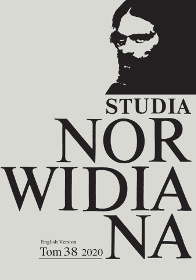Deotyma – Norwid’s “Tenth Muse”
Deotyma – Norwid’s “Tenth Muse”
Author(s): Olaf KrysowskiSubject(s): Language and Literature Studies, Studies of Literature, Polish Literature
Published by: Towarzystwo Naukowe KUL & Katolicki Uniwersytet Lubelski Jana Pawła II
Keywords: Romanticism; lyric poetry; improvisation; Muse; inspiration; irony
Summary/Abstract: This article attempts to recreate the image of Jadwiga Łuszczewska from the literary works and letters by Cyprian Norwid. The young improviser sparked controversy not only among the critics, but also among the Warsaw socialites in Romantic period. Norwid, however, considered her personality as original, modern and capable of refreshing Polish poetry. In his poems he describes her as “the tenth Muse” and compares her to Sappho, who was called exactly the same name by Plato in recognition of her poetic talent. Moreover, he depicts her in an idealized manner, like a contemporary sibyl who advises the nation on how to proceed in a tragic historical period. Norwid’s enthusiasm waned at the beginning of the 1860s when it became clear that the poetic works by Deotyma were becoming repetitive, constantly revisiting the same motives, ideas and aesthetic means, unable to go beyond the horizon defined at the onset of her career. He realized that behind the female figure he himself ennobled – as comforter, Samaritan, visionary, and statuesque Muse – there is a human being, imperfect and, in some aspects trivial, affected or even philistine.
Journal: Studia Norwidiana
- Issue Year: 2020
- Issue No: 38EV
- Page Range: 5-20
- Page Count: 16
- Language: English

